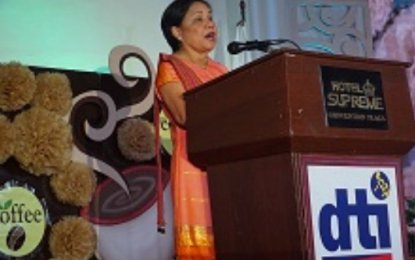
AGRI-ENTREPRENEURSHIP. Senator Cynthia Villar urges local coffee growers to learn agri-entrepreneurship during the opening program of the two-day 3rd National Coffee Conference at Hotel Supreme in Baguio City on Tuesday (March 20, 2018). (Photo by Primo Agatep)
BAGUIO CITY -- Senator Cynthia Villar has urged local coffee farmers to venture into "agri-preneurship", agri-tourism, and take trainings related to agriculture to improve their lot.
“Increasing production and farm productivity alone cannot move them permanently out of poverty. We must also teach small farmers capacity-building strategies and approaches to level up their knowledge and know-how to help them operate their small farms as agri-businesses to have alternative sources of income,” Villar said during the 3rd Coffee Conference at Hotel Supreme in Baguio City on March 20-21.
Villar, primary author of Farm Tourism Development Law, noted that there was an increase in the number of farmers who have converted their farms into farm tourism sites.
Many of them are now managing their farms as businesses, she said, noting it has become a win-win situation for the farmers.
“They farm, they accept tourists or visitors to their farms, and for those who have a school or learning site, they can also accept trainees or students. So, that’s three sources of income already and they do not even have to leave their farms,” she stressed.
Villar said that under the farm tourism law, training and education are emphasized and it mandates the Agricultural Training Institute (ATI) and Technical Education Skills Development Authority (TESDA) to “encourage farm tourism camps to become learning sites and accredited extension service providers, which the TESDA shall accredit as farm tourism camps for technical vocational institutions of agriculture and tourism courses".
The senator commended the Department of Trade and Industry's coffee industry cluster for organizing the conference, saying it gives industry players nationwide a venue to network, share knowledge, and learn about new innovations in the field.
“Events such as these can help expose coffee producers to new technology, equipment, and systems,” she said. "This will allow them, as your theme cites, the opportunity to ‘grow and brew together’.”
Villar cited the Philippine coffee industry has an edge in the global coffee market.
“We also have a lot of competitive advantages that work in our favor. For instance, the Philippines is one of the few countries that produce four varieties of commercially viable coffee --Arabica, Liberica (barako), Excelsa and Robusta. Thanks also to the favorable climatic and soil conditions in our country that are perfect for growing those coffee varieties,” she said.
She also noted a growing local coffee market.
Citing reports from the Philippine Coffee Board Inc. (PCBI), she said coffee consumption in the country is rising.
"I read that according to PCBI, it is now 170,000 metric tons (MT) per year, from only 75,000 MT in 2002. That is the good news,” she added.
She pointed out, however, that local coffee producers still have to grow faster.
“On the other hand, local production cannot keep up with the local requirement. The Philippines’ ratio of coffee production to coffee consumption is estimated at 35,000 MT produced to 120,000 MT consumed. Kaya naman nag-iimport pa rin tayo (that is why we still import),” she said.
Villar added that based on the International Coffee Organization (ICO) and the Philippine Statistics Authority (PSA), Philippine coffee production has been decreasing by 3.9 percent per year over the past decade.
“As you know, we are in the midst of regional economic reintegration under the ASEAN Economic Community (AEC), so competition is more intense and our regional neighbors are also leading coffee producers, so we have to keep up,” Villar reminded the coffee farmers.
She also mentioned the Coconut Industry Development Fund, where she pointed out that coffee is a good crop that could be used for intercropping with coconuts.
"We have over two million hectares of coconut farms that are ideal with coconut-coffee intercropping. Moreover, the Philippines has 3.5 million coconut farmers who earn only PHP57 a day, so this could provide a big boost to their income,” the senator said. “With intercropping ang mga coconut at coffee farmers ang pareho natin matutulungan (with intercropping, we can help both the coconut and the coffee farmers).”
Villar said in line with the code of Good Agricultural Practices developed for coffee by the Bureau of Agricultural and Fisheries Standards (BAFS), there is the so-called Coconut-Coffee-Based Enterprise Development Project (COCOBED), which involves planting high-quality materials of coffee in between spaces under coconut trees. The project also involved clustering of the farms to meet economies of scale.
She added there is also the coconut intercropping project (CIP) that involves coffee, banana, corn, pineapple, and vegetables, among others in between spaces under coconut trees. The selected crops for the purpose are based not only on biophysical suitability but also on its market demand and profitability. (PNA)
